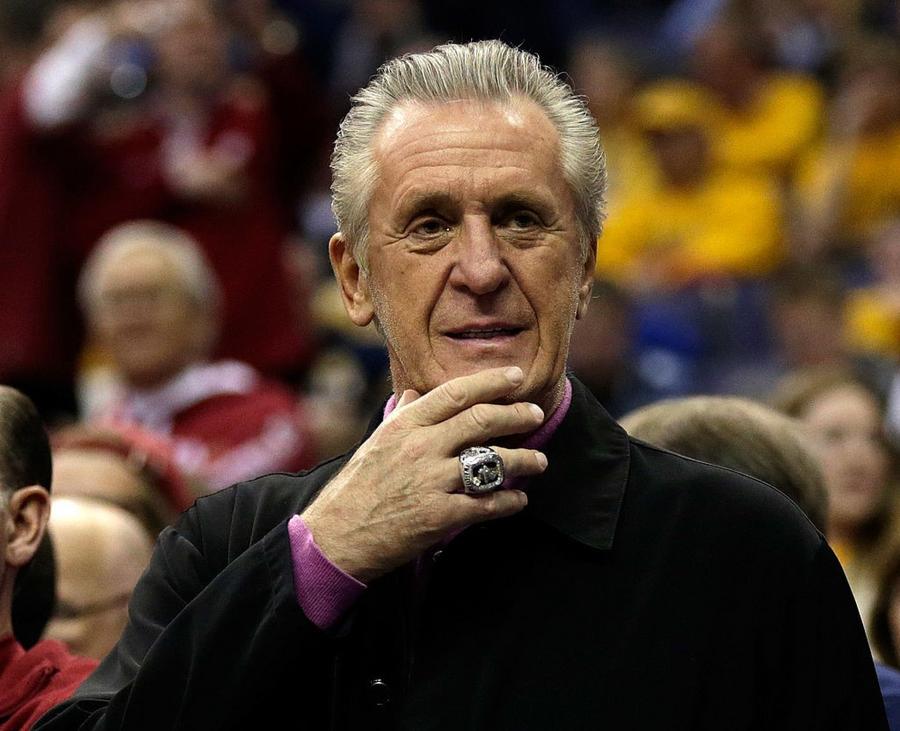With a victory over the Buffalo Bills, Patrick Mahomes and the Kansas City Chiefs are headed for the Super Bowl. And in case you were not aware, the Chiefs won the previous TWO Super Bowls. Therefore, if they are victorious, they will pull off the ever-elusive "three-peat."
Obviously, a third win in a row would be a huge accomplishment for Patrick, Travis Kelce, DeAndre Hopkins, and the entire Chiefs organization. And in a weird twist, a very interesting, unrelated person has a very interesting reason to be rooting extra hard for a three-peat: Former NBA coach Pat Riley.
Why is that? Not only would it be a huge validation of his talents as Team President, but Pat Riley also happens to own the trademark for the term "three-peat."

(Win McNamee/Getty Images)
History of the "Three Peat" Trademark
Pat Riley has an impressive resume. He won his first NBA Championship as a player on the 1972 Lakers, then went on to win five more rings as a head coach. Two of his rings came consecutively in 1987 and 1988 while he was coach of The Lakers.
Heading into the 1989 season, Lakers guard Byron Scott was the first person to use the term "three-peat" as a way to motivate his teammates. Pretty soon, "three-peat" became the rallying cry for all Lakers fans throughout Los Angeles. The three-peat looked like a done deal after The Lakers, led by league MVP Magic Johnson, swept Portland, Seattle, and Phoenix to land in the NBA finals against The Detroit Pistons. Unfortunately, The Pistons shut down all hope of a three-peat when they crushed The Lakers in a swift four-game sweep. But for Pat Riley, there was a silver lining.
After hearing Byron Scott use the phrase "three-peat," Pat Riley made a shrewd business decision. In November 1988, Riley submitted an application to trademark the term "three-peat" through his corporate entity "Riles & Co." A few months later, the application was approved, and trademark #1552980 was granted. This meant that anytime someone used that phrase commercially from that point on, they would have to pay Pat Riley a licensing royalty.
The Lakers did not pull off a three-peat in 1989, but just a few years later, the Chicago Bulls did. Twice. The Bulls won three consecutive championships from 1991 to 1993 then again from 1996 to 1998. And both times, Pat Riley made out like a bandit. In 1993, Riles & Co. earned an estimated $300,000 in licensing and royalty fees. In 1998, the royalty income doubled to nearly $600,000. Riles & Co. has cashed in on dozens of other three-peat occurrences. Even Riley's own Lakers finally pulled off the feat between 2000 and 2002.
Over the years, Riles & Co. was granted several other trademarks based on variations of the term, most notably "3 Peat". Riley also successfully defeated a group in Los Angeles that attempted to trademark the term "Three-Pete" in reference to USC football coach Pete Carroll's run at three consecutive national championships. When Riley challenged the trademark application, a patent court ruled that the spelling was not dissimilar enough, and "three-Pete" was rejected.
Over the years, the validity of the "three-peat" trademark has faced a few legal challenges. Various groups have claimed that the term has become too generic to be commercially trademarked. However, the US Patent and Trademark Office continues to defend their decision, and Pat Riley keeps cashing his royalty checks!
If you enjoy weird stories about money, royalties, billionaires, and long-forgotten fortunes that still touch our lives, please sign up for our newsletter, Deep Pockets. It's free and there are no ads. We send one incredible story a week, and each story has lessons that will teach you how to make a fortune. Subscribe by entering your email in the form below:
/2014/06/pat-riley.jpg)
/2025/02/GettyImages-2180637888.jpg)
/2022/04/GettyImages-1355958066.jpg)
/2016/05/GettyImages-520998440.jpg)
/2014/12/GettyImages-458023034.jpg)
/2020/02/buffer.png)
/2020/02/melissa-rivers.jpg)
/2020/11/Yella-Beezy.jpg)
/2020/08/cusack.jpg)
:strip_exif()/2020/06/taylor.png)
/2023/08/richard-dawson.png)
/2011/08/Doug-Hutchison.jpg)
/2010/07/GettyImages-80351333.jpg)
/2021/01/oldman.jpg)
/2012/11/GettyImages-470080838.jpg)
/2009/12/Mario-Lopez-1.jpg)
/2014/07/GettyImages-688457574.jpg)
/2023/04/Benny-Blanco.jpg)
/2013/12/GettyImages-131975557.jpg)
/2010/11/Liam-Neeson.jpg)
/2020/05/rh-1.jpg)
/2020/01/ks.jpg)
/2021/01/corey-harrison.jpg)